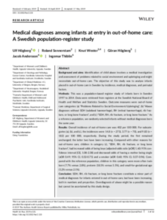

Displaying 771 - 780 of 1648
This paper explores how the principle of linked lives can illuminate our understanding of how relationships positively influence the educational journeys of adults with care experience over time.
This open access article reports on a qualitative study, which sought to retrospectively understand the contribution family group conferencing (FGC) makes to longer‐term outcomes for children at risk of entering State care and their families.
This article focuses on professional storytelling among child welfare social workers. It examines how social workers construct their professional role through team talk and the implications of this for our understanding of professional resilience and defensiveness.
"Scotland’s universities are to offer guaranteed undergraduate places to students who have been in care at any point in their lives as part of a groundbreaking effort to increase the number from that demographic doing a degree," according to this article from the Guardian.
The purpose of this article is to address at a broad level the issue of how overarching concepts of child protection and Islam influence social work practice with Muslim communities.
Therapeutic Interventions with Babies and Young Children in Care is about the value of observation and close attention for babies and young children who may be vulnerable to psychological and attachment difficulties.
The objective of this open access study was to analyse infants placed in out‐of‐home care in Sweden by incidence, medical diagnoses, and perinatal factors.
The current study provides an in-depth examination of the psychometric properties of the “Your Life, Your Care” survey which measured the subjective well-being (SWB) of children and young people in out of home care (OHC) in England and Wales.
This open access study examined the feasibility and acceptability of a randomized controlled trial (RCT) of mentalization-based therapy (MBT), delivered in a family-format, for children who are in foster care in the UK.
The aim of this article is to raise the voices of a group of birth mothers, a historically stigmatised, powerless and neglected group, with substantial experience of counselling following the loss of a child.

